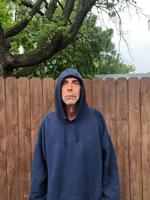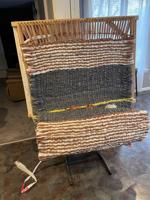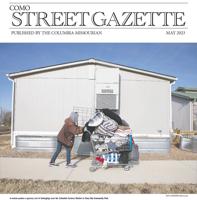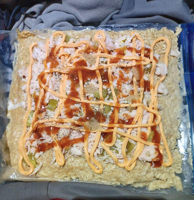David Webber, Columbia MISSOURAIN, March 23, 2024
Since last summer, I’ve been interacting often with Justin Trim, a 33-year-old local homeless man recently charged with stabbing a man downtown.
It’s a sad story that might have been prevented if our legal, social, health and education institutions were different.
Last July, a local group posted on social media that Justin had been released from a hospital and needed food he could consume through a straw. He had been involved in an altercation and was kicked in the head, requiring an operation on his jaw. A Good Samaritan put him up for a few nights at a low-cost hotel, after which two guys let him stay in their room. I delivered protein drinks and bananas to him several times and drove him to the Food Bank. I asked about his income and housing situation and arranged an appointment for him at Love Columbia, but he failed to show up.
Previously, Justin had lost his disability benefits because his identity was stolen. He had a trespassing change for sleeping in a vacant house a year ago.
Justin has nothing. No money, no identification, no disability benefits. As I slowly learned, he really does have nothing — no parents, no siblings, no girlfriend, no driver’s license, no car, no bike, no job, no place to go, no hobbies, no responsibilities, no favorite chair, nothing. It is hard to imagine having nothing.
I have known Justin for about six years from Room at the Inn and Loaves and Fishes and knew that a childhood stroke left him disabled on his right side. He walks with a severe limp and can’t use his right arm to eat or to defend himself. Unfortunately, he is not able to control his mouth. He has no filter, and that gets him in trouble with other homeless guys and people in authority. He is rather resilient; he can be charming; he has a good memory of his past; he never sought my pity. He thanked me when I helped him out. He reminded me of a 13-year-old boy. Justin would be easy prey due his disabilities, his uncontrollable mouth, his desire for social interaction and his insecurities.
On Oct. 12, Justin was arrested for cashing four checks worth $17,000 in Cole County and was incarcerated there with a $10,000 cash-only bail. When I could find no one who had contact with him, I drove to the Cole County Jail. He was in a solo cell “for his own protection” given his disabilities. I talked with him by phone several times, but mostly through instant messages. I tried to explain the legal process as I understood it. His stay was longer than it should have been because there was a misunderstanding about whether he had talked to a caseworker — he thought he had; the judge had no record that he did. It turns out that there are “public defender caseworkers” and “court caseworkers.” It was just one of several misunderstandings compounded by Justin’s disability.
On Dec.6, he was released; I picked him up at the jail and brought him to Columbia. We talked the whole way.
Driving home, I learned he graduated from a Ritenour High School in St. Louis and attended community college for three semesters. He has been robbed several times and lost a lot of electrical equipment that was a source of some income. He had some involvement with foster care. His father, a stepfather, his mother, and a girlfriend died in the past 10 years. He has two uncles, or perhaps step-uncles, one of whom I met, who will have nothing to do with him.
I accompanied Justin to a meeting with his public defender on Jan. 2. The attorney did an excellent job of insisting that he stay focused on the felony charge and suggested a possible plea bargain that would keep him out of jail but require supervised probation. A hearing was set for a few weeks later but was postponed until the end of March. At the beginning of March, the hearing was continued again, without his knowledge, until May because of a public defenders’ meeting.
Since Dec. 6, Justin was staying at Room at the Inn or on the streets. He made some progress with caseworkers to obtain identification and apply for disability benefits and a housing voucher. On March 13 he was arrested for stabbing someone in downtown Columbia. He is being held at Boone County jail without bail for armed criminal action and first-degree assault. He is in a peck of trouble.
The week before his arrest he told me he was set to receive a housing voucher but did not yet know of any housing options. I asked him how he would care for himself, and he thought he was eligible for a personal assistant and could use the OATS van for transportation. Now it’s likely Justin won’t be receiving disability benefits but will get “three hots and a cot” for several years in our correction system — costing society on an average of $34,000 a year.
I am disappointed and frustrated that no one, no organization or government program, was successful in changing the life trajectory fate dealt him. His family life was never stable, he suffered medical disabilities at the age of 12, he did not achieve a stable job. I know the public defender system is overloaded but it was moving at a slow pace, as it does for other homeless cases I have observed.
Room at the Inn and related homeless services gave him a cot out of the cold and some food, both of which are essential, but did not sufficiently assist him in obtaining permanent improvement in his life — one where he would achieve some independence and control or a sense of achievement, one where he had “pride in his past, and hope for the future.”
David Webber joined the MU Political Science Department in 1986 and wrote his first column for the Missourian in 1994.











